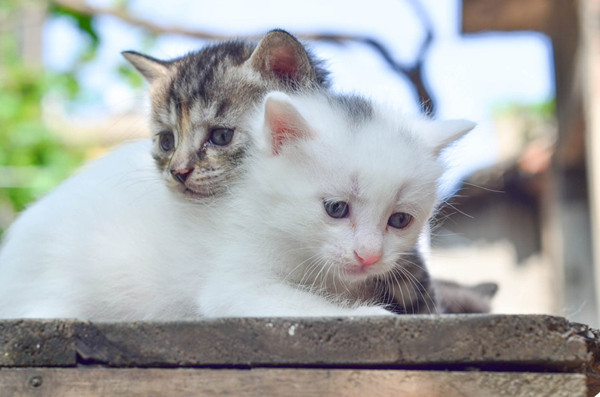The joy of life where cats and dogs are reigning
By Wang Shanshan ( China Daily ) Updated: 2016-04-23 12:47:53
 |
|
[File photo] |
I grew up in a large army garrison in the mountains, and no one kept pets there. The army had a pack of more than 20 wolf hounds, and as kids we never dared mess with them.
Pigs were fed in the garrison and chickens were raised in a coop in front of the apartment building where my family lived. Every family was allocated a vegetable plot of about 10 square meters, and each built their own chicken coop. My family had a dozen chickens, and for several years it was my job to feed them.
Animals were everywhere. In fact it was common to see snake skin on the roads, the remains of vipers that lived in the forest and that had decided to make one crossing too many and were obliterated by passing traffic. We would sometimes pick up the skins that had dried out in the sun and send them to the army hospital, having been told that they were an important ingredient in traditional Chinese medicine.
As for a daily tonic, that came from the chorus of singing that the birds staged each morning for us, although I obviously appreciated it less then than I do now. When I was 5, I found what was obviously an abandoned air rifle in a warehouse, and it became my toy for many years. In those days you could buy rifle bullets for 1 yuan a box in small shops outside the garrison. Thankfully for the birds and for everyone else in the garrison, the sights on the rifle were broken, and I never did manage to hit a living target, even if it was not for want of trying - in the case of the birds at least.
keeping pets
As an adult living in Beijing the animals that now inhabit my life - apart from the snarly and snarky motorists who bare their fangs whenever I hit the road - are dogs and cats. I have none myself, but many of my friends do. A friend shares her 37-square-meter studio with a golden retriever and a bulldog, and another lives with three cats.
Those friends who own dogs, and who used to sleep until noon, now get up at 6 am every day to walk their new love interest. "It's good," says the woman with the two dogs. "I'm so busy with them I have no time to worry about anything."
The bulldog was her second dog, a stray she found in a carpark near a subway station. She called me and asked if I wanted to adopt him, and I was tempted to say yes. But ultimately I decided it would be impractical and unfair on the dog, and when I told her of my decision I shed tears.
Even conceding that I may want a pet scares me. I always notice dogs that cross my path, but I give the owner barely a second glance. I have seen a neighbor's dog, with a bow on its head, prance all over its owner's feet and manage to undo a shoelace, a spectacle I thoroughly enjoyed.
A friend who adopted a small black dog three years ago, and who works mostly from home, says: "Dogs give humans the company that humans cannot."
Letting their space
Out in the mountains the animals had their territory and we had ours. Apart from the network of roads and footpaths that linked the garrison's units, in swathes of woods and forests, the animals enjoyed full sway. That became clear to me once after I quarrelled with my parents. I stayed out until it got dark and could hear the sounds, including howls, of animals from far and wide.
There was a large bamboo forest near my family's apartment, and every time we kids went in to dig out bamboo shoots, we never dared venture beyond its fringes, well aware that beyond lay hundreds of surviving relatives of those snakes who had been foolish enough to venture onto human territory.
Eventually when my family moved nearer to the city, living in the suburbs when I attended high school, it took some time to adjust, and I pitied schoolmates who had absolutely no ear for the singing of birds and who could not identify flowers or plants.
Now, in many ways, I have become a dyed-in-the wool urban animal. Just as those snakes had their bamboo groves and forests, we inhabit sprawling residential blocks and work in towering office buildings.
As that lifestyle isolates us ever more from nature and from one another, reaching out to animals seems to be just one way of finding a path back to things that matter.
wangshanshan@chinadaily.com.cn
|
|
|
|
|
|
|
|

























 Raymond Zhou:
Raymond Zhou: Pauline D Loh:
Pauline D Loh: Hot Pot
Hot Pot Eco China
Eco China China Dream
China Dream China Face
China Face






